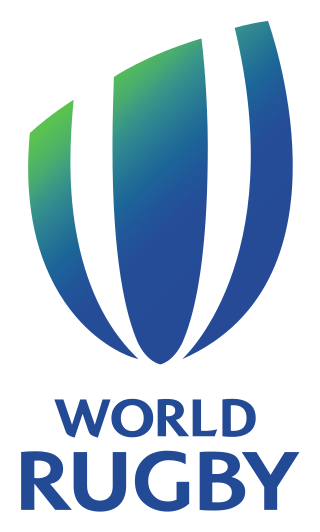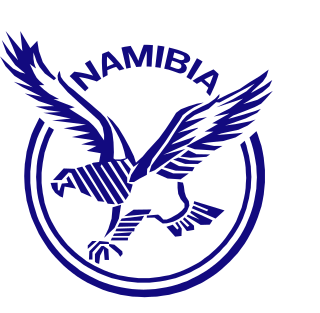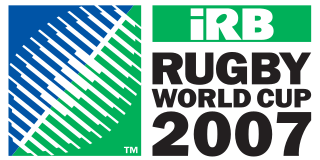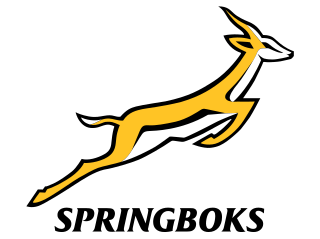
The Men's Rugby World Cup is a rugby union tournament contested every four years between the top international teams, the winners of which are recognised as the World champions of the sport.

The 1999 Rugby World Cup, was the fourth Rugby World Cup, the quadrennial international rugby union championship, the first World Cup to be held in the sport's professional era.

World Rugby is the governing body for the sport of rugby union. World Rugby organises the Rugby World Cup every four years, the sport's most recognised and most profitable competition. It also organises a number of other international competitions, such as the World Rugby Sevens Series, the Rugby World Cup Sevens, the World Under 20 Championship, and the Pacific Nations Cup.

The Namibia national rugby union team represents Namibia in men's international rugby union competitions nicknamed the Welwitschias, are a tier-two nation in the World Rugby tier system, and have participated in seven Rugby World Cup competitions since their first appearance in 1999. They are governed by the Namibia Rugby Union.

The 2007 Rugby World Cup was the sixth Rugby World Cup, a quadrennial international rugby union competition organised by the International Rugby Board. Twenty nations competed for the Webb Ellis Cup in the tournament, which was hosted by France from 7 September to 20 October. France won the hosting rights in 2003, beating a bid from England. The competition consisted of 48 matches over 44 days; 42 matches were played in 10 cities throughout France, as well as four in Cardiff, Wales, and two in Edinburgh, Scotland.

The South Africa national rugby union team, commonly known as the Springboks, is the country's national team governed by the South African Rugby Union. The Springboks play in green and gold jerseys with white shorts, and their emblem is the Springbok, a native antelope and the national animal of South Africa. The team has represented South African Rugby Union in international rugby union since 30 July 1891, when they played their first test match against a British Isles touring team. Currently, the Springboks are the top-ranked rugby team in the world and reigning World Champions, having won the World Cup a record four times. South Africa have won half of the Rugby World Cups they have participated in and are also the second nation to win the World Cup consecutively.

The 1995 Rugby World Cup, was the third Rugby World Cup. It was hosted and won by South Africa, and was the first Rugby World Cup in which every match was held in one country.
The Super Cup or Super Powers Cup was an international rugby union competition contested from 2003 to 2005. It featured teams representing Canada, Japan, Russia, the United States and Romania.
The Churchill Cup was an annual rugby union tournament, held in June, contested by representative men's teams from Canada, England, the United States, and other invited teams from a wide array of countries.

The Russia national rugby league team, nicknamed The Bears, represents Russia in international rugby league tournaments and other rugby league fixtures. The Bears, played their first fixtures against two British club sides: York Wasps and Fulham RLFC. In 2013, Russia became a full member of the Rugby League International Federation.

The India national rugby union team is the national team representing India in the international rugby championships and matches. It is governed by Rugby India organization which is recognised by Ministry of Youth Affairs and Sports of government of India.

Bryan Gary Habana OIS is a South African former professional rugby union player. Playing mainly as a wing, he is widely considered to be one of the greatest players in the history of the sport. He played for the Golden Lions, the Blue Bulls and Western Province in South Africa, for the Bulls and the Stormers in Super Rugby, and for Toulon in the French Top 14, and won 124 caps for the South Africa national team.
The first Rugby Union World Cup was held in 1987, hosted by Australia and New Zealand who pushed for the tournament to be approved. Since the first tournament, 9 others have been held at four-year intervals.

Rugby World Cup qualification is a process that determines which nations will compete at the Rugby World Cup, a men's rugby union competition.

The Morocco national rugby union team are a national sporting side, representing Morocco in rugby union. The team is also known as the Atlas Lions. Morocco is governed by the Fédération Royale Marocaine de Rugby. Morocco competes in the Africa Cup annually. The team has won the competition in 2003 and 2005. They usually play their internationals in Casablanca.

Rugby union in Kenya is a popular sport, in particular due to the success of the Kenya national rugby sevens team in the rugby sevens format, and tournaments such as the Safari Sevens, which has been growing yearly, and now includes numerous international teams.

The Madagascar national rugby union team represents Madagascar in the sport of rugby union. Although rugby is popular in Madagascar, the country has not yet qualified for a Rugby World Cup. It does compete annually in the Africa Cup, and was runner-up to Uganda in 2007. The national team's nickname is the Malagasy name for the ring-tailed lemur.

The 2003 Rugby World Cup was the fifth Rugby World Cup and was won by England. Originally planned to be co-hosted by Australia and New Zealand, all games were shifted to Australia following a contractual dispute over ground signage rights between the New Zealand Rugby Union and Rugby World Cup Limited. The pre-event favourites were England, regarded by many at the time as the best team in the world. New Zealand, France, South Africa and defending champions Australia were also expected to make strong showings, with New Zealand being second favourites after victory in the southern-hemisphere Tri-Nations championship.
The 2004 Africa Cup was the fifth edition of top level rugby union tournament in Africa. Ten teams were admitted, but Tunisia withdrew.














